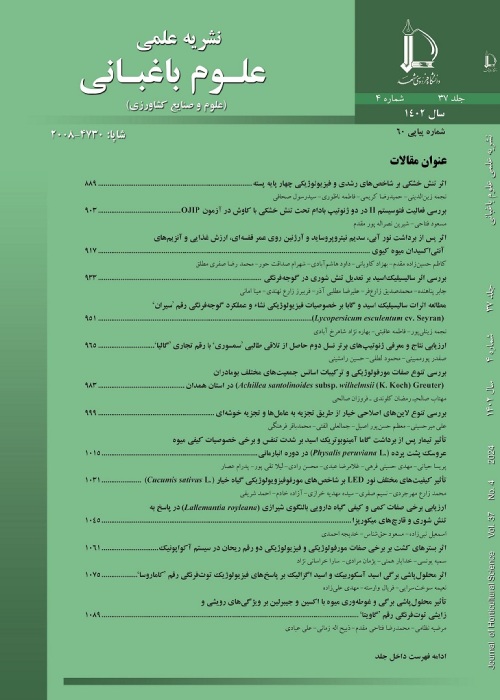Effect of Cinnamic Acid on Morphophysiological Characteristics of Cucumber Seedling under Chilling Stress
Low temperature is one of the most important environmental stresses that cause damage to plants and limit the geographical distribution of plant species. Plants of tropical and sub-tropical origin, such as cucumbers, are sensitive to cold stress and severely damaged at low temperatures. Plants have evolved a set of defense mechanisms to adapt to low temperatures. These mechanisms include the regulation of gene expression and physiological and biochemical changes that increase plant resistance to chilling stress. Cinnamic acid (CA) is one of the most important phenolic acids present in all plants and has antimicrobial properties against fungi and bacteria. The application of this compound in some plants causes oxidative stress and leads to the activation of antioxidant enzymes. Therefore, in the present study, the effects of exogenous cinnamic acid treatment on cold stress tolerance in cucumber seedlings have been investigated.
This research was conducted in the greenhouse and laboratory of the Department of Horticultural Sciences of Ilam University in 2019. Cucumber seeds (Super Daminus cultivar) were planted in a 1: 1: 1 ratio of field soil, manure, and sand. In the fully developed two-leaf stage, seedlings produced were sprayed using cinnamic acid (at concentrations of 0, 50, 100, and 200 μM). Foliar spraying treatments were applied at the mentioned concentrations until the surface of the leaves was completely wet. 24 hours after foliar application, all plants were exposed to cold stress at 3 ° C for 6 hours in six consecutive days. After applying the cold treatment, the seedlings were transferred to the greenhouse and 72 hours later, the traits were measured.
The results showed that exogenous CA application increased the growth characteristics of cucumber seedlings subjected to chilling stress. Improving the growth and development of plants under stress conditions by cinnamic acid treatment has been reported in other studies, which is consistent with the results of the present study. It has been reported that cinnamic acid treatment, by causing oxidative shock in plants, leads to plant defensive responses to stress conditions, and through this, plants can better withstand stress conditions. These defense responses include increasing compatible solutions and improving the antioxidant system. In the present study, the use of cinnamic acid treatment increased proline, chlorophyll, and total phenol and reduced of membrane lipid peroxidation, and these changes led to a decrease in the apparent effects of cold on cucumber seedlings.The use of chemicals that can mitigate the effects of cold on the plant can also help maintain plant growth under cold stress. In the present study, the application of cinnamic acid improved the growth of cucumber seedlings under cold stress conditions. Cinnamic acid pretreatment by inducing antioxidant compounds reduced the effects of cold on cucumber seedlings and improved plant growth in chilling conditions. Also, cinnamic acid treatment increased the growth of pepper plants under salinity stress, cucumber under drought stress, and wheat under drought conditions, which is consistent with the results of the present study. Therefore, it can be said that cinnamic acid improves plant growth under stress by changing physiological and biochemical processes. The results showed that the application of cinnamic acid improved the growth of cucumber seedlings under chilling stress conditions. Cinnamic acid pretreatment caused a significant increase in relative water content (25 to 32%), chlorophyll (108 to 125%), proline (152 to 244%), and total phenol (31%) compared to the control, therefore improving the adaptabilities of cucumber seedlings to chilling stress. The application of cinnamic acid also reduced the damage to cell membranes. The electrolyte leakage and malondialdehyde accumulation of cinnamic acid-treated seedlings were lower than that of control seedlings.
In general, the results of this study showed that the application of cinnamic acid reduced the effects of cold stress on cucumber seedlings. These results were associated with increased proline, chlorophyll, phenol and relative water content, in this way, the rate of ion leakage and accumulation of malondialdehyde in cucumber seedlings were reduced under cold stress. In general, the results showed that cinnamic acid treatment (especially concentration of 200 μM) can effectively reduce the effects of chilling on cucumber seedlings and improve their growth under cold stress.
- حق عضویت دریافتی صرف حمایت از نشریات عضو و نگهداری، تکمیل و توسعه مگیران میشود.
- پرداخت حق اشتراک و دانلود مقالات اجازه بازنشر آن در سایر رسانههای چاپی و دیجیتال را به کاربر نمیدهد.


